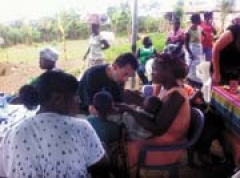Beads that Bless
The sale of Kairos 10 jewelry has allowed 30,000 malaria-preventing mosquito nets to be distributed in West Africa since 2010.
By: Sheryl Sowell | Category: Other | Issue: November 2014

Dr. David Morris treats patients at a health clinic in Ghana.
It is nearly impossible these days to turn on the news or have a conversation around the water cooler without the Ebola virus being brought up. Americans are becoming increasingly aware of this deadly virus since the first case of a patient diagnosed in the United States occurred last month. According to the Centers for Disease Control and Prevention, a serious outbreak of the Ebola virus is currently infecting and killing thousands of people in West Africa. The outbreak’s ramifications, however, reach far beyond those infected with the virus. An extreme shortage of health care is occurring in West Africa, causing hospitals to become overcrowded and unable to treat patients suffering from the region’s number one killer – malaria. To illustrate, consider this statistic from the World Health Organization (WHO): In Ghana, there are only 69,000 healthcare providers available to treat 24,233,431 people.
According to Phyllis Morris, a registered nurse and co-founder of the non-profit organization Kairos 10, “People who have little or no immunity to malaria, including children under 5, pregnant women and the elderly, are more likely to die from the disease. Death rates among young children and pregnant women may actually increase because they are unable to receive treatment as hospitals are overwhelmed with Ebola patients.”
Malaria is the top disease of morbidity in Ghana. It is caused by a parasite that commonly infects a certain type of mosquito which feeds on humans. People who get malaria are typically sick with high fevers, shaking chills and flu-like symptoms. “It is hard to believe that the number one cause of death for Ghanaians is both preventable and treatable,” says Phyllis. “Unfortunately so many are unable to receive treatment because they cannot afford it, or the healthcare resources are simply not available to them. An insecticide-treated bed net, which 100 percent prevents malaria, costs over a week’s wage.”
Phyllis, along with her husband, Dr. David Morris, and Katherynand Charles Pennington, founded Kairos 10 after traveling to Ghana to conduct medical missions. They witnessed child after sick child with temperatures of 105 degrees, and they wanted to follow God’s prompting to “do something sustainable.”
The basis of Kairos 10 is beautiful jewelry created by eight Ghanaian women. Beads produced from recycled glass and vinyl are purchased from Ghanaian bead merchants. Kairos then pays the Ghanaian women four times the minimum daily wage to make the jewelry. Funds from jewelry sales are used to purchase and distribute nets to families in several countries in West Africa, including Ghana, Uganda, Kenya, Zimbabwe, Nigeria, Sierra Leone, Indonesia and India. Over 30,000 nets have been purchased and delivered from September 2010 through September 2014. Additional Kairos 10 monies have provided water wells, anti-malarial medications, medical clinic construction, and funding for a school building.
Phyllis and David return each year (often twice a year) to distribute the nets and set up free clinics to help treat malaria as well as wounds, hypertension, measles, back pain, infections and more. They partner with Blessings International, a nationally recognized pharmacy, to provide quality anti-malarial medications.
“Due to poverty, illiteracy, inadequate medical personnel, and the marginal nature of the health care system in West Africa, people – including young children – are dying from a preventable, treatable disease,” says Dr. Morris. “Our goal through Kairos 10 is to provide aid for the people of West Africa and offer sustainable solutions to help prevent sickness and death from malaria.”
Kairos 10 jewelry is sold online and in several area retailers, including Catholic Book and Gift Store, Donna’s Fashions, Liv-a-Little Boutique, Pizzazzy Monograms, Raw Elements Salon and Willowbrush Studio. In addition, Kairos 10 will have a booth at An Affair of the Heart in Tulsa, November 21-23.
For more information, contact
Kairos 10
(918) 695-6949

About Author Sheryl Sowell
Sheryl Sowell was born and raised in Tulsa, OK. She graduated from Will Rogers High School and received her Bachelor of Arts in English from Northeastern State University in 2007. She has worked for Value News as editor, writer and advertising copywriter since 2008. She enjoys meeting and interviewing people for Value News articles, learning about their backgrounds, and helping to promote their businesses and local events. In her free time, she enjoys reading, trying new recipes and crafts from Pinterest, attending concerts and sporting events, and spending time with family and friends. Sheryl lives in Tulsa with her fiancé Paul, their daughter Scarlett, and their two dogs, Gunner and Boo.
Subscribe
For Free!



